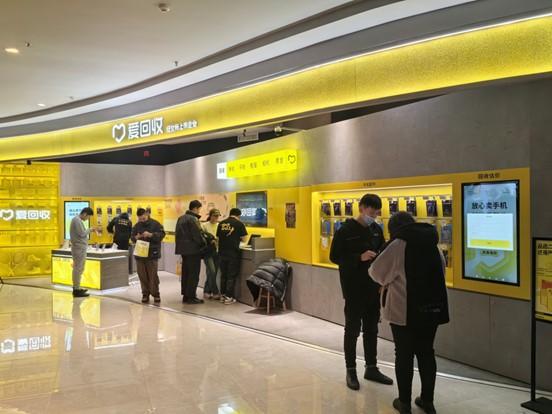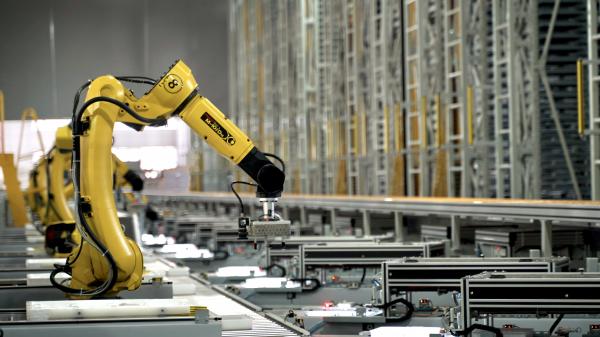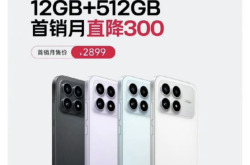The rise of cost-effective consumption, and the rise of the second-hand market
![]() 11/22 2024
11/22 2024
![]() 430
430
In recent years, the pursuit of the best cost-performance ratio has become a hot topic in the entire consumer sector. Consumers have become more cautious and rational when shopping, and major e-commerce platforms and consumer goods companies have also taken the provision of affordable and high-quality products as a strategic priority.
Under this trend, the second-hand market, which perfectly aligns with the concept of 'cost-effective consumption,' has become the focus of public attention. At the same time, national policies have also provided strong support to the second-hand industry, encouraging the replacement of consumer goods through trade-ins.
In the third quarter of this year, Renew Group (Aihuishou) achieved profitability for the first time at the GAAP level, not only demonstrating strong market adaptability and business resilience in a complex economic environment but also becoming a highlight in the second-hand market.
Full Profitability
With increasing consumer demand for second-hand electronic products, coupled with the promotion of the trade-in policy, the second-hand electronic product market has broad development prospects.
On November 20th, Renew Group released its third-quarter 2024 earnings report, showing total revenue of RMB 4.05 billion for the quarter, a year-on-year increase of 24.4%. In terms of revenue composition, 1P (self-operated) product revenue reached RMB 3.67 billion, a year-on-year increase of 25.6%; 3P (platform) service revenue was RMB 380 million, a year-on-year increase of 13.9%.
Although the growth rate of 3P (platform) service revenue is relatively low, the stable growth of this part of the business indicates that Renew Group's platform service model has been recognized by the market, attracting more and more third-party merchants to join, enriching the platform's ecosystem.
At the same time, Renew Group's profitability has also been fully optimized. In the third quarter, it achieved an operating profit of RMB 24.89 million and a net profit of RMB 17.88 million, achieving full profitability under GAAP standards for a single quarter.
Renew Group's non-GAAP (adjusted, excluding employee stock incentive expenses, intangible asset amortization, and deferred costs due to acquisitions, the same below) operating profit in the third quarter exceeded RMB 100 million, a year-on-year increase of 40.9%; the non-GAAP operating profit margin increased from 2.3% in the same period last year to 2.6%, achieving profitability for nine consecutive quarters. The non-GAAP net profit for a single quarter was RMB 90.06 million, a significant year-on-year increase of 89.3%, and the non-GAAP net profit margin increased from 1.5% in the same period last year to 2.2%.

By analyzing Renew Group's business layout, the main reasons for the enhanced profitability may lie in scale effects, operational efficiency, and product mix. On the one hand, as the volume of business continues to expand, scale effects gradually emerge, and costs in procurement, logistics, marketing, and other aspects can be effectively shared. For example, with the increase in recycling business volume, cooperation with logistics suppliers has deepened, reducing unit logistics costs.
On the other hand, operational efficiency has been improved by optimizing internal management processes and digital operation systems, reducing unnecessary operational links and resource waste. For example, the automated quality inspection system represented by Matrix 3.0 reduces losses due to quality inspection errors throughout the year by 19%.
Furthermore, the product mix has been optimized, with a gradual increase in the proportion of high value-added products and services. Taking the multi-category recycling business as an example, the multi-category recycling volume reached RMB 950 million in the third quarter, a year-on-year increase of over 270%, and corresponding service revenue increased by over 400% year-on-year. Its rapid growth not only drove the expansion of revenue scale but also had a positive effect on the overall profit level.
In the second-hand consumer electronics market, price fluctuations are relatively frequent due to various factors such as new product launches, technological upgrades, and seasonal changes in consumer demand. Relying on financial stability, Renew Group maintains relatively stable operations amidst market price fluctuations. As of the end of the third quarter of 2024, the company's cash and cash equivalents, restricted funds, short-term investments, and third-party payment platform account balances totaled RMB 2.35 billion.
Furthermore, financial stability has also brought deeper competitive advantages to Renew Group. In terms of business expansion, whether it's opening new offline stores, expanding online business channels, or launching new service projects, all require financial support. Abundant financial resources enable the enterprise to have strong strategic investment and business expansion capabilities, utilizing cash for strategic investments in related technology and supply chain enterprises to improve its industrial chain layout.
A sound financial position also helps enhance cooperation between the enterprise and its partners and investors' confidence. For suppliers, the company's sufficient cash reserves imply more reliable payment capabilities, enabling access to higher-quality supply resources and more favorable cooperation conditions. When cooperating with financial institutions, such as applying for loans or conducting financial service cooperation, a stable financial position enables it to obtain lower interest rates and higher credit lines.
For investors, financial stability is one of the critical indicators for assessing an enterprise's investment value. The company's financial situation can attract more investors, whether strategic or financial investors, providing continuous financial support and resource integration opportunities for the company's long-term development.
In terms of shareholder returns, in the third quarter of 2024, Aihuishou used USD 12.1 million to repurchase nearly 4.9 million ADS. It is understood that the current repurchase plan allows Aihuishou to use up to USD 50 million for repurchases by June 27, 2025. As of September 30, 2024, USD 20.1 million had been returned to shareholders, with a total of approximately 8.2 million ADS repurchased.
Multi-category Expansion
The predecessor of Renew Group, 'Aihuishou,' was launched in April 2011, positioned as a 'second-hand digital recycling platform.' Through the three brands of 'Aihuishou,' 'Paijitang,' and 'Paipai,' it has built a full-link transaction system from recycling to sales, realizing a complete 'C2B+B2B+B2C' business ecosystem closed-loop model.
To engage in the second-hand trading business, it is first necessary to address the two major issues of user trust and transaction efficiency. To this end, Renew Group adopts an O2O model, effectively integrating online and offline resources and services.
Online, users can submit recycling applications through Renew Group's self-built platform or cooperation entrances with e-commerce platforms like JD.com, enjoying services such as door-to-door recycling and express delivery. Its convenience and efficiency make more users willing to try second-hand transactions, thereby expanding market coverage. Offline, users can conduct face-to-face transactions directly at stores and experience professional quality inspection services, which not only improves transaction efficiency but also enhances user trust in the platform through standardized service processes.
As of the end of the third quarter of 2024, Renew Group had 1,637 offline stores covering 263 cities nationwide, becoming one of the most influential offline channels in the second-hand trading market.
As consumer awareness of environmental protection and sustainable development increases, demand in the second-hand market is growing. However, traditional second-hand trading platforms mostly focus on a single category of goods, such as electronics or clothing, unable to meet users' diverse needs.
To seize this market opportunity, Renew Group began implementing a multi-category recycling strategy in the second quarter of 2022, expanding its business scope from second-hand 3C products to bags, watches, gold, fine wine, shoes, clothing, and other areas.
As of the end of the third quarter, 587 Aihuishou stores nationwide were equipped with multi-category recycling capabilities. Simultaneously, the multi-category recycling business contributed nearly 9% of service revenue in the third quarter, compared to 1.7% in the same period in 2023. By category, gold and second-hand luxury goods are the core categories of multi-category, accounting for 77% and 18% of the scale, respectively, but in terms of service revenue contribution, the two categories are roughly equal.
The multi-category recycling strategy not only provides users with more choices but also increases user stickiness through cross-selling. Users can complete multiple types of recycling needs on one platform, improving platform usage frequency and user satisfaction. Additionally, the multi-category recycling strategy helps Renew Group better utilize existing resources, such as logistics and warehousing, reducing operating costs.
Data shows that among users who complete luxury goods recycling transactions, 18% complete recycling of other categories within 30 days. The NPS (Net Promoter Score) of the gold recycling business ranks first among all categories, demonstrating users' recognition of the platform's services.
From a purchasing trend perspective, users' acceptance of second-hand quality products has also increased significantly. In the third quarter, the total revenue of self-operated and strictly selected toC retail business, including online JD Paipai and Aihuishou's official website, and offline Aihuishou stores, reached RMB 970 million, a year-on-year increase of over 120%.
Moreover, sales revenue of strictly selected second-hand goods through JD Paipai channels, Aihuishou's official website and store self-operated channels, and new media retail channels in this quarter increased by 87.4%, 301.3%, and 114.6% year-on-year, respectively.
Renew Group's in-depth cooperation with well-known brands such as JD.com, Huawei, and Apple not only provides users with a more convenient and affordable shopping experience but also brings more sales opportunities to brand merchants. Taking the cooperation with JD.com as an example, when users purchase a new machine on the JD.com platform, they can choose to use an old machine to offset part of the payment, and Renew Group is responsible for recycling and processing these old machines, realizing the recycling of resources.
Intelligent Technology Renews Second-hand Goods
Facing issues such as information asymmetry, difficult-to-guarantee quality, and low transaction efficiency in the traditional second-hand market, technological innovation has become the key for enterprises to solve these problems.
In response to the non-standardized characteristics of used second-hand 3C products, Renew Group has independently developed systems based on computer vision, including the 'Photo Box' system for automatic detection of subtle scratches on mobile phones, the '007' system for automatic wiring and testing of hardware product functions, and the 'X-Ray' system for identifying whether mobile phone components have been replaced or repaired without disassembling the phone.
Coupled with automated assembly lines and mechanical warehouses, the entire system has an automation rate of over 90%, a sorting error rate of less than 0.01%, mobile phone quality inspection accuracy of over 99%, a 40% reduction in manpower, sorting time shortened to one-third, and space utilization efficiency increased by 300%.

Renew Group's investment in technological innovation and operational efficiency improvements has not only addressed the pain points of the second-hand market, changed the operating mode of the traditional second-hand 3C industry, but also built a deep competitive barrier for it in the fiercely competitive market.
In August this year, in the latest ESG evaluation by S&P Global Corporate Sustainability Assessment (CSA), Renew Group scored 35 points, further improved from 2023, surpassing 93% of global retail peers, with a data availability rating of 'very high.'
Since the beginning of this year, Renew Group has also jointly launched the 'Return to Life' campaign with multiple well-known consumer goods brands, enhancing brand participation in the circular economy and encouraging users to choose environmentally friendly and green lifestyles. During the China International Import Expo in November, Renew Group reached a strategic cooperation with the well-known beauty group L'Oréal to jointly explore solutions for recycling empty beauty plastic bottles, creating a new model for recycling empty bottles in the beauty industry and practicing ESG and circular consumption.
In the future market, enterprises represented by Renew Group face many development opportunities. On the one hand, with continuous technological advancements, the detection and refurbishment technologies for second-hand equipment will become more mature, further enhancing product quality and consumer experience and tapping into market demand.
On the other hand, continuous policy support and increased consumer awareness will bring broader market space to the second-hand and circular economy. Renew Group can leverage its brand advantages and technological strength to further expand its market share and business areas, such as extending to more categories of second-hand goods.
However, Renew Group also faces challenges in market competition and technological updates. In terms of market competition, as the second-hand economy market gradually heats up, more and more enterprises are beginning to venture into this field, leading to increasingly fierce competition. How to maintain technological leadership, high-quality service, and brand influence among many competitors is an issue that enterprises need to continuously address.
In terms of technological research and development, due to the rapid upgrading of electronic products, it is necessary to continuously invest research and development resources to adapt to new product types and technical standards, ensuring the effectiveness of quality inspection, sorting, and other technical systems.
In terms of consumer trust, although Renew Group already has high trust, improper handling of individual quality issues or service disputes may damage the brand image. Therefore, it is necessary to continuously improve the after-sales service system and strengthen communication and interaction with consumers.
With advancements in technology, product diversity, and quality assurance, second-hand goods can meet the needs of different consumers and provide a way for budget-conscious consumers to save expenses. Simultaneously, policy support and improved regulations provide norms and trust foundations for the market. Therefore, the second-hand market will increasingly be favored due to its ability to meet economic, environmental, and socio-cultural needs.






